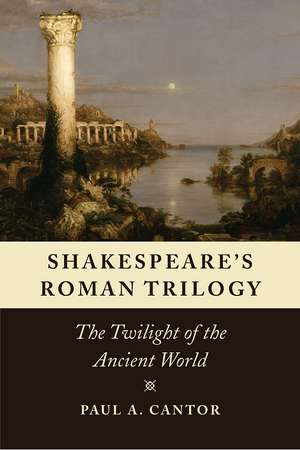Shakespeare's Roman Trilogy: The Twilight of the Ancient World
Autor Paul A. Cantoren Limba Engleză Paperback – 28 iun 2017
Paul A. Cantor first probed Shakespeare’s Roman plays—Coriolanus, Julius Caeser, and Antony and Cleopatra—in his landmark Shakespeare’s Rome (1976). With Shakespeare’s Roman Trilogy, he now argues that these plays form an integrated trilogy that portrays the tragedy not simply of their protagonists but of an entire political community.
Cantor analyzes the way Shakespeare chronicles the rise and fall of the Roman Republic and the emergence of the Roman Empire. The transformation of the ancient city into a cosmopolitan empire marks the end of the era of civic virtue in antiquity, but it also opens up new spiritual possibilities that Shakespeare correlates with the rise of Christianity and thus the first stirrings of the medieval and the modern worlds.
More broadly, Cantor places Shakespeare’s plays in a long tradition of philosophical speculation about Rome, with special emphasis on Machiavelli and Nietzsche, two thinkers who provide important clues on how to read Shakespeare’s works. In a pathbreaking chapter, he undertakes the first systematic comparison of Shakespeare and Nietzsche on Rome, exploring their central point of contention: Did Christianity corrupt the Roman Empire or was the corruption of the Empire the precondition of the rise of Christianity? Bringing Shakespeare into dialogue with other major thinkers about Rome, Shakespeare’s Roman Trilogy reveals the true profundity of the Roman Plays.
Cantor analyzes the way Shakespeare chronicles the rise and fall of the Roman Republic and the emergence of the Roman Empire. The transformation of the ancient city into a cosmopolitan empire marks the end of the era of civic virtue in antiquity, but it also opens up new spiritual possibilities that Shakespeare correlates with the rise of Christianity and thus the first stirrings of the medieval and the modern worlds.
More broadly, Cantor places Shakespeare’s plays in a long tradition of philosophical speculation about Rome, with special emphasis on Machiavelli and Nietzsche, two thinkers who provide important clues on how to read Shakespeare’s works. In a pathbreaking chapter, he undertakes the first systematic comparison of Shakespeare and Nietzsche on Rome, exploring their central point of contention: Did Christianity corrupt the Roman Empire or was the corruption of the Empire the precondition of the rise of Christianity? Bringing Shakespeare into dialogue with other major thinkers about Rome, Shakespeare’s Roman Trilogy reveals the true profundity of the Roman Plays.
Preț: 242.40 lei
Nou
Puncte Express: 364
Preț estimativ în valută:
46.39€ • 47.92$ • 38.61£
46.39€ • 47.92$ • 38.61£
Carte tipărită la comandă
Livrare economică 25 martie-08 aprilie
Preluare comenzi: 021 569.72.76
Specificații
ISBN-13: 9780226462516
ISBN-10: 022646251X
Pagini: 320
Dimensiuni: 152 x 229 x 18 mm
Greutate: 0.43 kg
Ediția:1
Editura: University of Chicago Press
Colecția University of Chicago Press
ISBN-10: 022646251X
Pagini: 320
Dimensiuni: 152 x 229 x 18 mm
Greutate: 0.43 kg
Ediția:1
Editura: University of Chicago Press
Colecția University of Chicago Press
Notă biografică
Paul A. Cantor is the Clifton Waller Barrett Professor of English and Comparative Literature at the University of Virginia. He is the author of Shakespeare’s Rome: Republic and Empire, also published with a new preface by the University of Chicago Press, and the Hamlet volume in Cambridge’s Landmarks of World Literature series.
Cuprins
Preface to the Paperback Edition
Preface to the First Edition
Introduction: Romanness in Shakespeare
Part One: Coriolanus
1. The Republican Regime
2. The City without a Ruler
3. The Man without a City
Part Two: Antony and Cleopatra
4. The Politics of Empire
5. The Liberation of Eros
6. Love and Tyranny
Notes
Index
Preface to the First Edition
Introduction: Romanness in Shakespeare
Part One: Coriolanus
1. The Republican Regime
2. The City without a Ruler
3. The Man without a City
Part Two: Antony and Cleopatra
4. The Politics of Empire
5. The Liberation of Eros
6. Love and Tyranny
Notes
Index
Recenzii
“Shakespeare’s Roman Trilogy is a marvelous and masterful work. Cantor is a widely followed critic and the justifiably preeminent American interpreter of Shakespeare’s plays. His capacious intellect and intense intellectual curiosity are decidedly on display in this compelling argument that Coriolanus, Julius Caesar, and Antony and Cleopatra comprise a trilogy meant to document the decline and fall of the Roman republic, both in the lives of the individual heroes, and in the life of the Roman city or polis. Under Cantor’s guidance, the reader is introduced to a new, more profound and compelling Shakespeare.”
“Cantor has written another wonderful book. His profound interpretations of Shakespeare speak to the decline of the ancient world and the rise of our modern one. His penetrating chapter on Nietzsche, a substantial contribution in its own right, places Shakespeare and Nietzsche in dialogue about the history of the West. And Cantor’s comparisons between Shakespeare and Plutarch are a delight! This book will be widely read and discussed.”—Mary Nichols, Baylor University
"In his first book, Shakespeare's Rome, [Cantor] treated the three plays 'Coriolanus,' 'Julius Caesar,' and 'Antony and Cleopatra' as a chronicle of Rome from city to empire. Now, in Shakespeare's Roman Trilogy, he advances a more ambitious thesis: These plays constitute a thematically unified whole, a trilogy dramatizing, in the terms of his subtitle, 'The Twilight of the Ancient World.' . . . Shakespeare is indeed a philosophical poet, and nowhere more so, as the present book demonstrates, than in his Roman trilogy."
